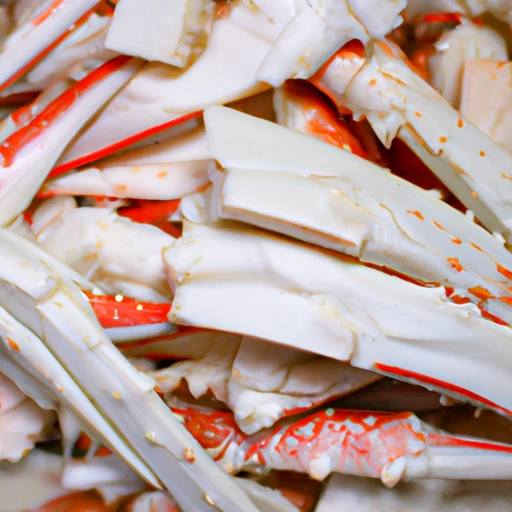Crabmeat
Description

Crabmeat refers to the meat found within a crab's exoskeleton. It is a tender, sweet, and succulent seafood ingredient savored in cuisines all around the world. Crabmeat can be extracted from a variety of crab species, with flavor and texture varying slightly between them. It is often sold in several forms, including lump, backfin, jumbo lump, claw, and imitation, each suited for different types of dishes.
Common uses
Crabmeat is commonly used as a primary ingredient in seafood dishes, salads, appetizers, soups, and pastas. It is also popularly incorporated into dips, stuffing, and as a topping for various recipes.
Nutritional value
Calories
Crabmeat is low in calories, with approximately 100 calories per 3 ounces (85 grams).
Protein
It is a great source of high-quality protein, offering about 20 grams per 3 ounces (85 grams).
Fat
Crabmeat contains a minimal amount of fat, with less than 1 gram of fat per 3 ounces (85 grams).
Carbohydrates
It is low in carbohydrates, with less than 0 grams per 3 ounces (85 grams).
Vitamins
Crabmeat is rich in vitamins, particularly Vitamin B12, and also contains vitamins A, B6, and C.
Minerals
It is an excellent source of minerals such as zinc, copper, selenium, and phosphorus.
Health benefits
Crabmeat is known for its heart health benefits due to its high omega-3 fatty acid content. It also supports brain health, boosts immunity, and may help in weight management. Additionally, the rich content of vitamins and minerals in crabmeat plays a vital role in maintaining bone health, improving metabolism, and promoting healthy blood cells.
Potential risks
While crabmeat is nutritious, it may also contain high levels of sodium and cholesterol, which should be considered by individuals with dietary restrictions. Those with shellfish allergies should avoid crabmeat altogether to prevent allergic reactions.
Common recipes
Crabmeat is featured in recipes like crab cakes, crab bisque, California rolls, and crab rangoon. It's also used in seafood paella, cioppino, and crab salad.
Cooking methods
The versatility of crabmeat allows for various cooking methods, including steaming, boiling, baking, sautéing, and frying.
Pairing with other ingredients
Crabmeat pairs well with ingredients such as lemon, butter, garlic, cream, and fresh herbs. It also complements other seafood, like shrimp and scallops, and is enhanced by spices like Old Bay seasoning.
Summary
Crabmeat is a delicious and nutritious seafood ingredient that adds a touch of luxury to dishes. With its versatile nature, it can be used in a multitude of recipes and cooking styles. Whether enjoyed in sophisticated gourmet dishes or simple, home-cooked meals, crabmeat offers a delectable taste experience that is cherished worldwide.